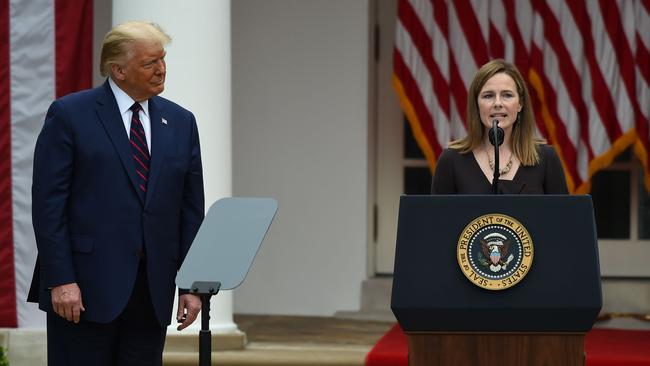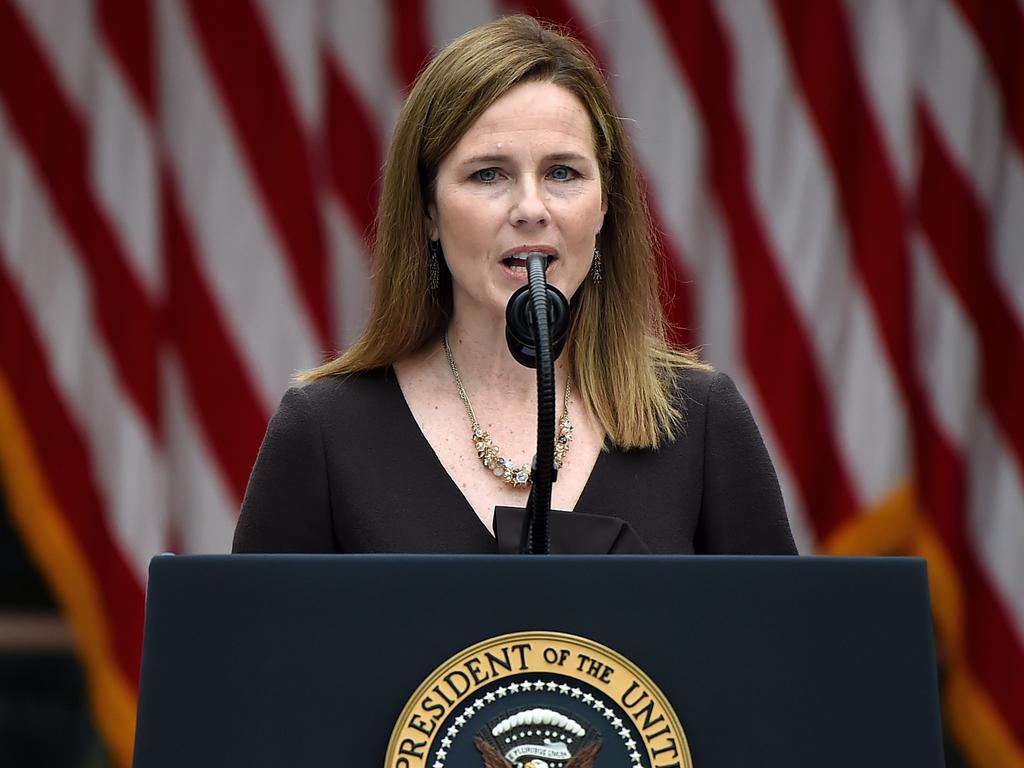Trump’s Supreme Court call will influence American life for decades

Australians cannot miss President Donald Trump’s determination to replace Ruth Bader Ginsburg on the US Supreme Court. His decision to nominate Amy Coney Barrett is attracting more attention than the search under way to make two appointments to our own High Court. This says much about the role of the US Supreme Court as a political body compared to our more low-key institution.
Ginsburg achieved a celebrity status attained by few judges worldwide. She achieved remarkable success as an advocate and judge in changing US law to embed equality for men and women. Her impact was extraordinary because of how this drove widespread social reform, whether it be higher pay for women or equal access to education. She also laid a foundation for recognising other rights, including those of the gay and lesbian community.
Her achievements reflect the distinctive role of the US Supreme Court as an agent of social change. The court is a highly politicised institution in which judges are readily identified as Republican or Democrat appointees. It is also well-known for its willingness to assert its authority in resolving contentious social issues. In the US, people often turn to the court rather than their elected representatives on subjects such as reproductive rights, gun control, euthanasia and same-sex marriage.
Trump is seeking to appoint a third justice, one more than Bill Clinton, George W Bush and Barack Obama achieved in eight years as presidents. This has galvanised Trump’s re-election campaign. Supreme Court judges are appointed for life, so a careful selection could extend his influence well past 2050.
Trump’s judicial appointments may be his most significant political legacy.
Trump has championed America’s most conservative legal figures and has promised only to nominate those opposed to abortion rights. This will further the polarisation of the body and perceptions that it is an instrument of political power.
Barrett comes at the opposite end of the judicial spectrum to liberal icon Ginsburg. She has only served as a lower court judge since 2017 but has a record that excites enthusiasm among conservative voters. She has referred to abortion as “always immoral” and as a judge has favoured restrictions on access to it.
Her faith is also central to her character and work as a lawyer. She has called on new lawyers to “always keep in mind that your legal career is but a means to an end”, and “that end is building the kingdom of God”. Her willingness to invoke religion as a guiding principle has attracted strong conservative support as well as strong criticism from the left. If confirmed by the Senate, 48-year-old Barrett will have the rest of her life to remake US law, including to undo many of Ginsburg’s decisions.
There is a good chance that Trump’s appointees will cement a shift on the court not seen for the best part of a century. For much of its history, the Supreme Court was renowned for favouring property rights over personal rights. In 1857 in the notorious case of Dred Scott v Sandford, it denied the rights of slaves to liberty in favour of the property rights of their masters.
In later cases the court favoured business interests, including by striking down a law setting a minimum wage for women.
Matters came to a head in the 1930s with the election of president Franklin D Roosevelt. The court stood in the way of his New Deal program to lift America out of the Great Depression. The result was a constitutional crisis. In 1937 Roosevelt announced a plan to “pack” the Supreme Court by increasing it from nine to 15 judges. The plan was defeated in the Senate, but the president nonetheless won the day.
Enough judges changed their mind to overturn earlier decisions, which was followed by an exodus from the court enabling Roosevelt to make six appointments. This resulted in decisions protecting civil and political rights, such as Brown v Board of Education in 1954 (overturning racial segregation in public schools) and Roe v Wade in 1973 (giving women the right to terminate their pregnancy).
The more contentious of these decisions, especially those on abortion, provoked a powerful counterreaction. This has been fuelled by more recent decisions, including in 2015 to guarantee same-sex marriage. Such cases have made the court a focal point of community and political attention. Trump’s response is to promise a new, conservative majority able to overturn many of these cases. There is every chance that he will succeed as his third selection would produce a 6:3 majority of conservative judges.
What remains to be seen is how Democrats respond if they win the White House and a Senate majority. The stakes are so high that they may be unwilling to accept conservative domination of the Supreme Court. They may even turn to the old idea of increasing the size of the court so it can be stacked with new judges. This would do tremendous damage to the institution and further erode its credibility as an independent decision-maker sitting above politics. But then again, perhaps such credibility is already lost. The US Supreme Court has been damaged as yet another partisan battleground in a deeply divided society.
George Williams is a deputy vice-chancellor and professor of law at the University of New South Wales.




